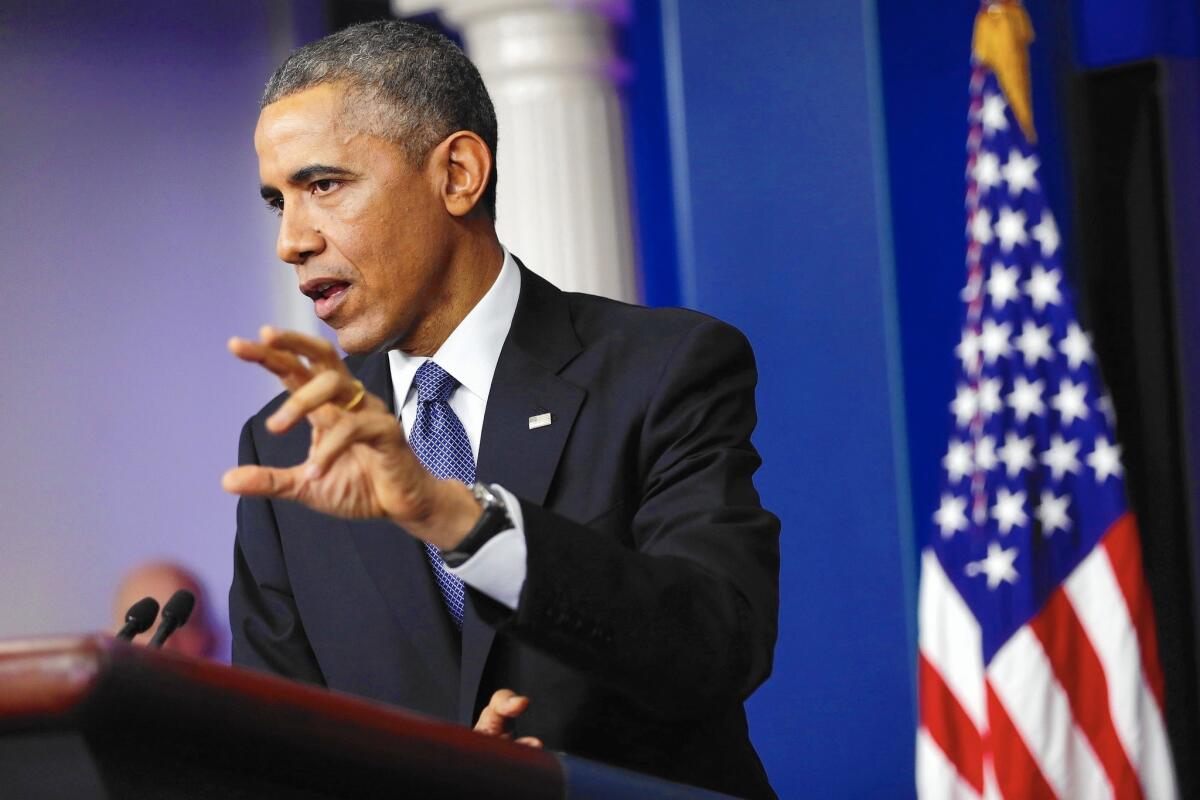Obama says change in Cuba is inevitable, though pace is uncertain

- Share via
Reporting from WASHINGTON — Two days after announcing the end of a half-century-long diplomatic freeze with Cuba, President Obama warned Friday that the pace of reform in the communist island nation would be uncertain but that change was inevitable.
In a wide-ranging news conference that also touched on North Korea’s cyberattack on Sony Pictures and the future of his relations with Congress, Obama was repeatedly asked about his decision to begin bringing America’s Cold War-era policy regarding Cuba to a close — especially given the human rights record of the government in Havana.
“This is still a regime that represses its people,” Obama acknowledged, arguing that a new policy of engaging with President Raul Castro would help chip away at the barriers around Cuba’s “hermetically sealed” society and that Cubans would push for change.
“Change is going to come to Cuba,” Obama said. “It has to.”
Obama’s remarks came at his end-of-year news conference, two days after he announced his administration’s Cuba policy changes, timed to coincide with the release of American Alan Gross from a Cuban prison.
On Wednesday, Obama swept away more than 50 years of official separation between the two countries. His phone conversation with Castro this week was the first time a U.S. president has spoken to a Cuban head of state since the 1959 Cuban revolution.
On Obama’s orders, Secretary of State John F. Kerry is at work to begin top-level talks with the Cuban government and to open an American embassy in Havana. The U.S. is also easing restrictions on travel to Cuba and increasing the amount of money that people can send to friends and family on the island.
The ties, the White House believes, will make life better for Cubans living in isolation and poverty.
Critics of the president’s policy believe that it mainly empowers the Castro government. Though U.S. engagement with China and Vietnam have strengthened their economies and improved the daily lives of many who live in those countries, the critics argue, it has also empowered their authoritarian governments.
Raul and Fidel Castro are still the “implacable enemies of the United States,” Sen. Ted Cruz (R-Texas) wrote in an opinion piece sent by his office Friday. Their goal is to copy Russian President Vladimir Putin, who, Cruz writes, fooled the West by appearing to change while “his authoritarian government consolidated power.”
Obama is finding support from some business leaders and other Republicans, including Sen. Rand Paul of Kentucky. In his own opinion piece Friday, Paul argued that the experience with China and Vietnam showed that engagement was the best way to “overcome and defeat communism.”
“Communism can’t survive the captivating allure of capitalism,” wrote Paul, who, like Cruz, is considering a presidential run in 2016. “Let’s overwhelm the Castro regime with iPhones, iPads, American cars, and American ingenuity.”
Obama said he didn’t expect lawmakers would soon lift the economic embargo on Cuba that has been in place for decades, but he said he hoped they would eventually do so and predicted a healthy debate in Congress.
“If you’ve done the same thing for 50 years and nothing’s changed, you should try something different if you want a different outcome,” Obama said.
The president added that easing travel and the prospect of better telecommunications and Internet access would inevitably change how Cubans live.
Turning to domestic issues, Obama speculated about the possibility that he might be able to work on tax reform with Republicans who take control of Congress in January.
Republicans have said they share the same goal, he said, adding that “the devil’s in the details.”
The president would like to simplify the tax code and close some loopholes while freeing up money to pay for infrastructure.
He said that he wasn’t resigned to gridlock and that there were “real opportunities to get things done” with the new Congress.
“I take Speaker [John A.] Boehner and Mitch McConnell at their words that they want to get things done,” he said of the House and Senate Republican leaders.
As for the controversial Keystone XL oil pipeline project, Obama refused to tip his hand about whether he would approve it, and he sidestepped a question about whether he would sign a measure from the Republican Congress giving it the green light.
“I’ll see what they do,” he said. “We’ll take that up in the new year.”
More to Read
Sign up for Essential California
The most important California stories and recommendations in your inbox every morning.
You may occasionally receive promotional content from the Los Angeles Times.











